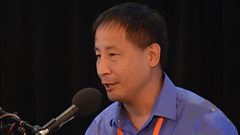Peering into Space at Aspen Ideas Festival
Cutting-edge space science, including asteroids, dark matter and how to detect tiny units
Cutting-edge space science from this year's Aspen Ideas Festival in Colorado. Former astronaut Edward Lu explains why we urgently need to map all sizeable near-Earth orbit asteroids if we want to avoid becoming 'dinosaur toast'. Also, Lisa Randall, a theoretical physicist at Harvard, explores the mysteries of dark matter - the invisible, seemingly inert stuff, which is thought to account for about a quarter of the mass-energy of the known universe. And Fermilab's Craig Hogan is behind a new experiment to probe the fabric of space itself, by seeing if it's possible to detect the very tiniest units in the universe.
(Image: From left to right, presenter Bridget Kendall, Craig Hogan, Edward Lu and Lisa Randall. Credit: © All rights reserved by aspeninstitute-internal
Last on
More episodes
Clip
Chapters
-
Ed Lu: Hunting for deadly asteroids
Duration: 14:23
Lisa Randall: Probing the mysteries of dark matter
Duration: 08:37
Craig Hogan: Measuring the bandwidth of reality
Duration: 17:07
Ed Lu
![Ed Lu]() Are we smarter than the dinosaurs? Former NASA astronaut and now an asteroid hunter Edward Lu says the jury is still out. There are about a million sizeable asteroids in Near-Earth orbit, each capable of wiping out a major population centre, and yet we have discovered less than half of one percent of them. Within five years, Lu’s could start mapping thousands and thousands of large asteroids, giving us warning of approaching danger, but will we have the foresight to support his mission?
Are we smarter than the dinosaurs? Former NASA astronaut and now an asteroid hunter Edward Lu says the jury is still out. There are about a million sizeable asteroids in Near-Earth orbit, each capable of wiping out a major population centre, and yet we have discovered less than half of one percent of them. Within five years, Lu’s could start mapping thousands and thousands of large asteroids, giving us warning of approaching danger, but will we have the foresight to support his mission?
Photo © All rights reserved by aspeninstitute-internalLisa Randall
![Lisa Randall]()
What if there is a proportion of dark matter which interacts with ordinary matter much more strongly than we’d thought? Harvard physicist Lisa Randall says that new data will soon become available from cosmic observations and terrestrial experiments which will shed light on her new theory about . If proven correct, there is a chance that dark matter might even influence the paths of comets through the Solar sytem.
Photo © All rights reserved by aspeninstitute-internalCraig Hogan
![Craig Hogan]()
Imagine trying to measure the effects of cosmic jitter at a scale billion billion times smaller than an atom. (That’s right, a billion billion times!). This is what Craig Hogan’s team at in Batavia is attempting. If successful, it should give us fundamental insights into the nature of space itself: is it classically smooth or in discrete units, like grains of sand on a beach?
Photo © All rights reserved by aspeninstitute-internalComments on the programme
Maybe it would be a good thing if an asteroid did hit the earth. I hope it wipes out all humans, but leaves some species like apes alive to repopulate the Earth with more planet-friendly creatures.
Charles de Matas
Wow, what a brilliant show, imagination on fire. Bridget Kendall and team, well done!
Romjan Ali
Next week:
If you put art and artists in unexpected places, can it help change the world for the better? The second of this year’s Forums from the Aspen Ideas Festival with former New York City Ballet principal Damian Woetzel, ground-breaking designer Fred Dust, and a man who describes himself as creating ‘happy surprises’, art collector and philanthropist Dennis Scholl.Broadcasts
- Sat 6 Jul 2013 15:06GMT����ý World Service Online
- Sat 6 Jul 2013 23:06GMT����ý World Service Online
- Sun 7 Jul 2013 10:06GMT����ý World Service Online
- Mon 8 Jul 2013 02:06GMT����ý World Service Online
Do you think political or business leaders need to be charismatic? Or do you prefer highly competent but somewhat stern people?
Podcast
-
![]()
The Forum
The programme that explains the present by exploring the past







